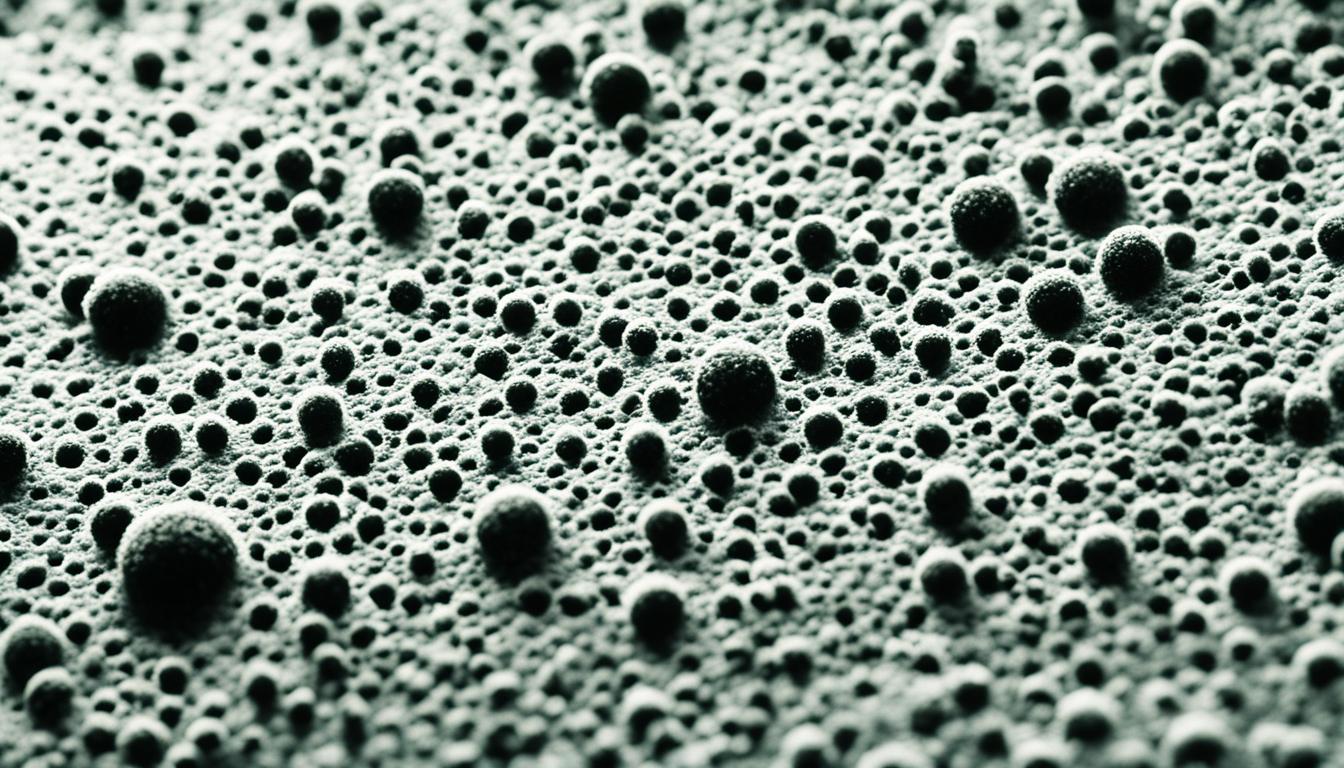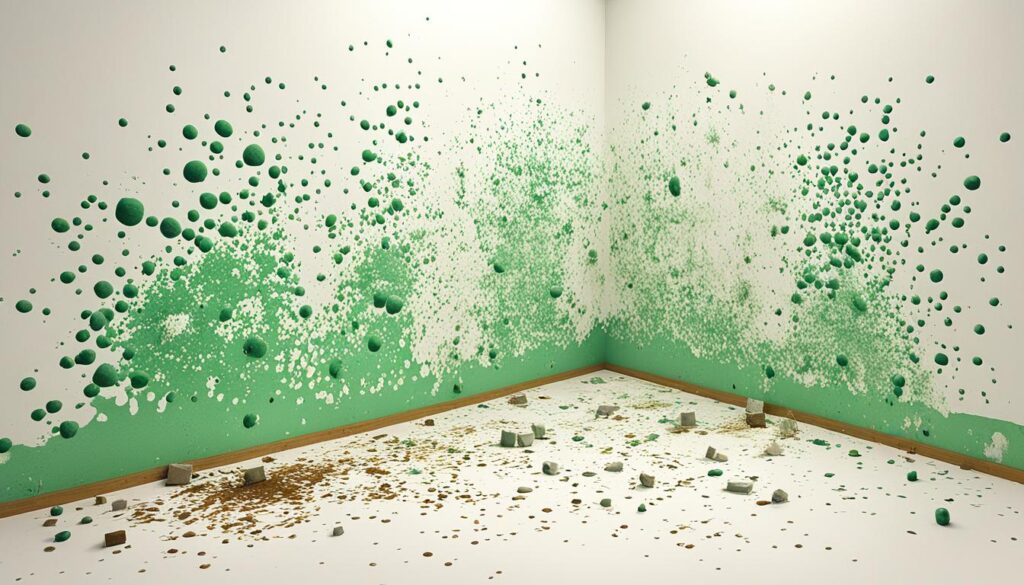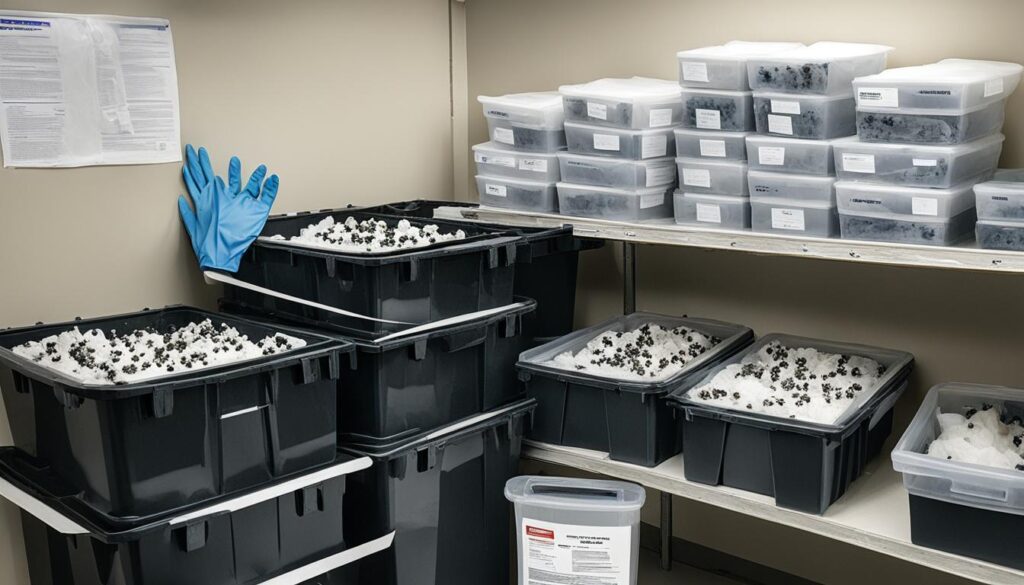
Black Mold Spore Spread to Nearby Stored Items
Black mold is not only harmful to your health but can also pose a risk to your belongings stored in close proximity to mold-contaminated areas. The ability of black mold to release spores and their potential spread to nearby items is a cause for concern.
Understanding how mold spores are transmitted can help you assess the risks and take necessary precautions. Mold releases spores into the air, which can be carried by air currents to settle on nearby objects. Factors such as humidity, air circulation, and the proximity between mold-infested areas and stored items contribute to spore settlement.
It’s crucial to recognize the potential risks of mold spores on stored belongings. These spores can deteriorate the integrity of materials, contaminate surfaces, and even cause health issues. Mold spores can easily latch onto fabrics, furniture, documents, and other items, compromising their cleanliness and usability.
Prevention is key to protecting your stored items from black mold spore spread. Implementing strategies such as proper ventilation, controlling humidity levels, regular cleaning, and adopting sound storage practices can significantly minimize the risks. By taking these preventive measures, you can safeguard your belongings and ensure their longevity.
Key Takeaways:
- Black mold spores can spread to belongings stored in close proximity to mold-infested areas.
- Mold spores are transmitted through the air and can settle on nearby objects.
- Mold spores on stored items can lead to material deterioration and health risks.
- Preventive measures such as proper ventilation and humidity control can minimize mold spore spread.
- Seeking professional assistance, like Fix Mold Miami, can help with mold assessment, prevention, and remediation.
Understanding Mold Spore Transmission
In this section, we will delve into the mechanics of mold spore transmission. Understanding how mold spores travel and settle on nearby objects is crucial in assessing the risk of mold spore spread to stored belongings.
The Release of Mold Spores
Mold, including black mold, releases microscopic mold spores into the air as part of its reproductive process. These spores are incredibly small, measuring about 1-30 microns, and can easily become airborne when disturbed.

Airborne Travel
Once mold spores are released, they can be carried by air currents to different parts of a building. This means that mold contamination in one area can potentially spread to other areas, including stored belongings in close proximity.
It is important to note that mold spores are extremely lightweight and can remain suspended in the air for extended periods of time, allowing them to travel to distant locations within a building.
Settlement on Nearby Objects
When airborne mold spores come into contact with surfaces, they can settle and begin to grow under the right conditions. Factors that contribute to the settlement of mold spores on nearby items include:
- Proximity to the mold-contaminated area
- Absorbent materials that can trap spores
- Poor ventilation that allows spores to accumulate
- High humidity levels that promote mold growth
Assessing the Risk to Stored Belongings
Understanding how mold spores travel and settle on nearby objects is crucial in assessing the risk of contamination to stored belongings. Depending on the extent of mold growth and the conditions surrounding the stored items, the risk of mold spore transfer can vary.
| Risk Factors | Description |
|---|---|
| Proximity | Belongings stored in close proximity to mold-infested areas have a higher risk of spore transfer. |
| Mold Growth | The presence of visible mold growth indicates a higher concentration of mold spores and an increased risk of spore transfer. |
| Exposure Time | The longer stored belongings are exposed to mold spores, the higher the risk of contamination. |
| Material Porosity | Materials that are porous and can absorb moisture, such as fabrics and paper, are more susceptible to spore settlement and mold growth. |
By considering these factors, individuals can make informed decisions regarding their stored belongings and take appropriate preventive measures to minimize the risk of mold spore transfer.
Risks of Mold Spores on Stored Belongings
When it comes to mold spores, the risks they pose to stored belongings cannot be underestimated. Mold spores have the ability to settle and thrive on a variety of surfaces, including furniture, clothing, and personal belongings. Their presence can not only affect the integrity and cleanliness of these items but also pose potential health risks to individuals.
One of the main concerns when it comes to mold spores on stored belongings is the risk of black mold contamination. Black mold, also known as Stachybotrys chartarum, is a particularly hazardous type of mold that releases toxic compounds known as mycotoxins. These mycotoxins can cause a range of health issues when ingested, inhaled, or come into contact with the skin.
The close proximity of mold-contaminated areas to stored belongings increases the likelihood of mold spores settling on these items. Once mold spores settle, they can begin to grow and multiply, leading to further contamination and potential damage. Additionally, the mycotoxins produced by black mold can easily transfer to stored items, posing health risks to individuals who come into contact with them.
“Mold spores can quickly spread to belongings in close proximity, compromising their cleanliness and potentially triggering allergic reactions or respiratory issues.” – Dr. Jane Marshall, Mold Specialist
To fully understand the risks associated with mold spores on stored belongings, it is important to recognize the potential consequences. Mold-contaminated items may develop an unpleasant odor, visible stains, and even structural damage over time. Moreover, individuals who come into contact with mold-contaminated items may experience allergic reactions, respiratory issues, and other health concerns.
To address these risks and protect stored belongings, it is crucial to implement effective prevention techniques. Regular cleaning, proper ventilation, and maintaining optimal humidity levels can help minimize the chances of mold spores settling on items. Additionally, utilizing proper storage practices, such as keeping belongings in dry and well-ventilated areas, can further reduce the risk of mold contamination.
Recognizing the risks and taking proactive steps to prevent mold spore spread to stored belongings is essential for maintaining their integrity and ensuring the safety of individuals interacting with these items. By being vigilant and implementing preventive measures, you can safeguard your cherished belongings and promote a healthier living environment.

Key Takeaways:
- Mold spores can settle on stored belongings in close proximity to mold-contaminated areas.
- Black mold contamination poses additional risks, as it releases toxic mycotoxins.
- Mold-contaminated items may develop odor, stains, and structural damage over time.
- Individuals who come into contact with mold-contaminated items may experience health issues.
- Prevention techniques such as regular cleaning, proper ventilation, and storage practices can minimize the risk of mold spore spread.
Preventing Mold Spore Spread to Stored Items
In order to protect your stored items from mold spores, it is essential to implement preventive measures that minimize the risk of spore spread. By taking the following steps, you can significantly reduce the chances of mold contamination:
- Proper Ventilation: Ensure that the storage area is well-ventilated to promote air circulation. This can help prevent the buildup of moisture that can contribute to mold growth and spore release.
- Humidity Control: Monitor and maintain optimal humidity levels in the storage space. Keeping humidity below 50 percent can inhibit mold growth and reduce the likelihood of spores spreading to stored items.
- Regular Cleaning: Regularly clean and inspect the stored items and the storage area itself. Dust and debris can provide a favorable environment for mold growth, so it is important to keep the area clean and free from potential mold food sources.
- Protective Storage Practices: Store items in airtight containers or plastic bins to create a barrier between the items and potential mold spores. Consider using moisture-absorbing products such as silica gel packets to further protect stored belongings.
Implementing these prevention techniques will help safeguard your stored items from mold spores and minimize the risk of mold contamination. By taking proactive measures to control moisture, promote ventilation, and maintain cleanliness, you can effectively mitigate the spread of mold spores.
Remember, prevention is key when it comes to protecting your stored items from mold spores. By taking these steps, you can create a safer environment for your belongings and prevent the potential damage and health risks associated with mold contamination.
For a visual representation of the preventive measures to protect stored items from mold spores, refer to the table below:
| Prevention Techniques | Benefits |
|---|---|
| Proper Ventilation | Promotes air circulation and prevents moisture buildup. |
| Humidity Control | Maintains optimal humidity levels to inhibit mold growth. |
| Regular Cleaning | Prevents the accumulation of dust and debris that can contribute to mold growth. |
| Protective Storage Practices | Creates a barrier between stored items and potential mold spores. |
Mold Assessments, Prevention, and Remediation
When it comes to addressing mold issues in your home or workplace, seeking professional assistance is crucial. That’s where Fix Mold Miami comes in. As Florida’s top-rated provider of mold assessments, prevention, and remediation services, we have the expertise and experience to effectively tackle mold spore problem areas.
Mold spores have the ability to transfer to nearby items, posing risks to your health and the integrity of your belongings. At Fix Mold Miami, we understand the importance of thorough assessments to identify the extent of mold contamination and determine the most appropriate course of action.
Our team of highly trained professionals utilizes state-of-the-art equipment and techniques to detect and remove mold, ensuring a safe and healthy environment. We follow industry best practices and adhere to strict guidelines to prevent further spread of mold spores during the remediation process.
Whether you’re dealing with black mold, mildew, or other types of molds, we have the knowledge and resources to provide comprehensive solutions. Our preventive measures focus on eliminating the conditions that promote mold growth, such as excess moisture and poor ventilation.
When it comes to mold prevention, we offer guidance on proper maintenance, ventilation, and humidity control to help safeguard your home or workplace from future mold issues. Our team can also provide recommendations on storage practices to minimize the risk of mold spores settling on your stored items.
“Fix Mold Miami helped me address a severe mold problem in my basement. Their professional team conducted a thorough assessment and quickly remediated the issue. I highly recommend their services for anyone dealing with mold contamination.”
– Sandra Martinez, Miami, FL
At Fix Mold Miami, we are committed to delivering exceptional service and ensuring the complete satisfaction of our clients. We take pride in our attention to detail, efficiency, and the long-lasting results we achieve.
If you’re concerned about mold spore transfer to nearby items or suspect mold contamination in your home or workplace, don’t hesitate to get in touch with Fix Mold Miami. Our knowledgeable team is ready to address your mold concerns and provide effective solutions.
| Why Choose Fix Mold Miami: | Contact Information: |
|---|---|
|
|
Conclusion
In conclusion, it is crucial to recognize the risks associated with black mold spore spread to belongings stored in close proximity. Mold spores are tiny particles that can easily travel through the air and settle on nearby items, potentially leading to contamination. These spores can pose various risks to stored belongings, including structural damage, discoloration, and potential health hazards.
Prevention is key when it comes to protecting your stored items from mold spores. By implementing proper ventilation, controlling humidity levels, and regularly cleaning and maintaining your storage area, you can significantly reduce the chances of spore transmission. Additionally, it is important to take preventive measures when storing items, such as using airtight containers or covers to provide an extra layer of protection.
However, in case mold contamination does occur or preventive measures are not sufficient, it is essential to seek professional assistance. Companies like Fix Mold Miami specialize in mold assessments, prevention, and remediation. Their expertise can help identify and address mold issues effectively, ensuring the safety and cleanliness of your stored belongings.
By being proactive in preventing mold spore spread and seeking professional help when needed, you can minimize the risks of black mold contamination on your stored belongings and maintain a clean and safe storage environment.




